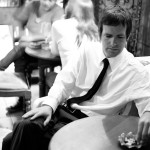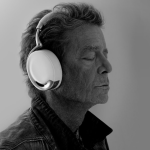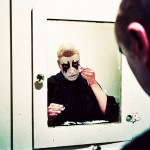“I never adopt a conscious persona. The whole process is wrapped in mystery.”
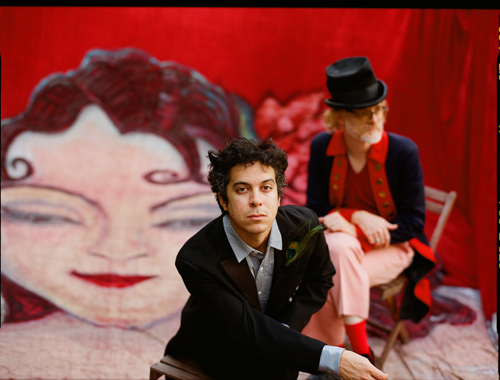
By Aimee Rawlins
Although he’s been a staple on the indie scene for much of the last decade, some would say M. Ward is just beginning to hit his stride. If you ask him, however, it’s the same stride he’s been working toward since his 1999 debut, Duet For Guitars #2, albeit with a bit more fanfare these days.
With Ward serving as one-third of the self-proclaimed “Monsters of Folk†(with My Morning Jacket‘s Jim James and Bright Eyes‘ Conor Oberst) and one-half of 2008’s breakout duo She & Him (with Zooey Deschanel), it would be easy to excuse him for not releasing music under his own moniker. But the Portland-based singer will release his fifth full-length, Hold Time, on February 17. To Ward, the record is just another piece of the puzzle, a continuation of all he’s been working on–and listening to–for years.
“I don’t write ‘records.’ I just compile all my old four-track tapes.”
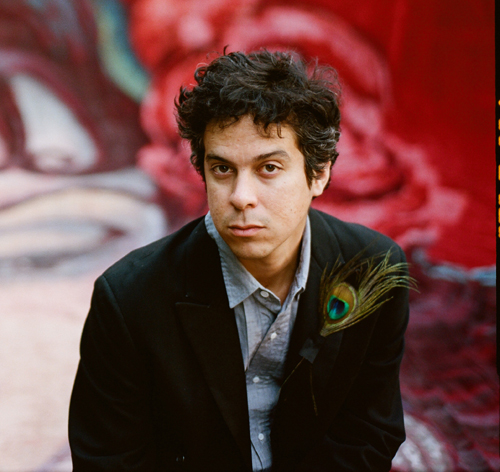
self-titled: Are you just here in New York to do press?
I’ve been here for a few days. I did one interview yesterday, but now the rest of the week is all rapid-fire. I took some time off to do a charity thing last night. It was really fun.
Tell me about that.
I played some songs at the American Airlines Theatre, something that Rosie Perez organized for a foundation called Urban Arts, and it was awesome. It was about 20 to 30 actors, and it was called the “24-Hour Plays.†We all met Sunday night, and the writers stayed up all night writing six plays. And they got performed last night, and I sang songs before each segment.
That’s fun. Who were some of the actors?
Saturday Night Live people–Horatio Sanz, Rachel Dratch…
Is Urban Arts something you’re involved with in Portland?
No, I think it’s mainly a New York thing. It helps educate young people about the arts.
Did Perez randomly ask you to be involved?
Well, She & Him–my band with Zooey–we were invited, but Zooey had to go to Europe, but I was going to be in New York anyway and wanted to take part. It was cool.
Did your work with She & Him elevate the sort of attention you receive?
It’s sort of just a different flavor of publicity. I don’t know if it’s more or less….It attracts different attention.
And your new album comes out in February, so do you work on new stuff in the meantime, or do you just focus primarily on the current album?
I’ve been doing a little bit of demo-ing with Zooey for our next project. Between that and doing publicity and having some time off for holidays…that’ll be my life.
That makes sense. Are you someone who has to sit down with the intention to write, or do you just write it as it comes?
I write it as it comes. I don’t have any scheduled time. I probably should.
Well, it’s seemed to work OK for you so far. No reason to mess with a good thing.
Yeah, I can’t imagine just treating the writing side of things as a job, but I know some people do it and more power to them.
Do you work differently when you’re writing a record that’s specifically yours?
I don’t really think I write for a record; I don’t write “records.†I just compile all my old four-track tapes when it comes time to make a record.
And is that the same whether you’re contributing to other people’s albums or working on your own stuff?
Yeah, I mean I do a little bit of compiling with the Zooey project. She sends me a bunch of demos, and I pick the ones I think are finished. But most of the time for a record, the biggest thing is just listening to demos over and over again. The actual recording side of it is very small.
So do you get everything planned out and detailed and then you just go in there and make it happen?
Pretty much. You leave a lot open to chance. But at least half of the process is making sure you have a good foundation, and then the other half is being open to happenstance–happy mistakes.
And does that happen frequently?
On the good records, it does. On the bad recordings…
They’re just mistakes?
It’s either a series of bad mistakes or everything was just too pre-programmed and you didn’t allow enough time for chance. I think, if I was a journalist–I’ve thought about this–it seems like you sit in front of your computer with a general idea of what you’re going to write about, but then once you start picking up speed…
The story sort of takes on a life of its own.
Making a record is very similar to that.
Live with Jenny Lewis
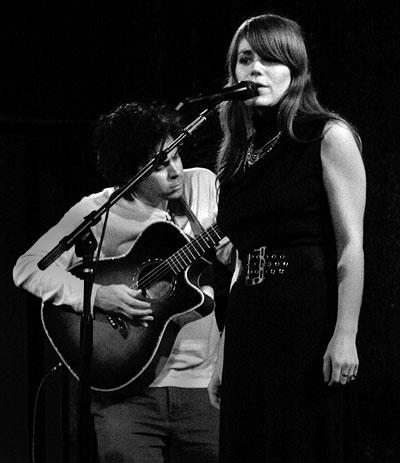
I can identify with that. So what about when you’re working with people like Jenny Lewis or Conor Oberst?
With Jenny, she gives me specific songs that she’s working on, so the process with her is very, very fast. With Conor, it’s a similar thing. We know more ahead of time what we’re going to be doing, whereas with Zooey, it’s more collaborative.
And you’re working tentatively on something with Jim James and Conor Oberst.
Yeah, and with Mike Mogis. And it’s going really, really well…really, really slowly because it’s very difficult to have all of us in the same zip code.
I would imagine.
But I’m really excited about that project, too.
And that’s for much down the road?
2010 I would say.
Do you write primarily in Portland?
Yeah, sometimes when I’m traveling but mostly in Portland with my four-track.
Are you inspired by the Willamette Valley and the Columbia River?
I’d like to think so but not really. I’m mainly inspired by listening to old records, listening to the radio, reading The New York Times, watching the news. Just normal, everyday things.
And when you wrote your current album, did you approach it with a specific intent?
The records aren’t really written at the same time at all. It’s over a span of years and years and years.
So you could potentially pull stuff for this album that you’d written way back?
In high school.
And did you?
Well, the songs morph over time, so it’s almost impossible for me to say how old something is.
But pieces of it could stretch back?
Yeah, it gives me a headache to think where all these songs came from, so I just don’t think about it.
Do you adopt a sort of persona when you write, or do you write all from personal experience?
I never adopt a conscious persona. The whole process is wrapped in mystery. I don’t understand how the songs happen. I think all the songs come from older songs that I’ve grown up listening to. The biggest influence is the music that I’ve been listening to since I was little–before I can remember.
Who are some of the biggest influences?
The people who my parents listened to, which is a lot of classical music, Johnny Cash, gospel. That music has been in my head since day one. And then, when I was in high school, I discovered this label called SST, and the music on that label opened my eyes to a lot of possibilities. They had the Meat Puppets, Sonic Youth, Iron Rose, Dinosaur Jr. And those bands meant a lot to me.
“Chinese Translation”
On the new track, “Stars of Leo†you sing, “I was born on the first day of December; that means a beginning and an end.” Is your birthday really on the first day of December?
It is not. [Laughs] So that’s a persona.
Was the process for this album different for you from previous ones?
Not really. All the records I’ve ever made are all pretty much the same. The process was sort of created without my knowing it, from my first record. And I loved the process, and I decided to keep it.
Fair enough.
I don’t think any of the records I’ve ever made sound that different from each other. I think they’re all pretty similar.
Do you approach writing lyrics versus music differently, or does it all work together?
It all works together.
So you’re not scratching poems down on napkins and putting it to music later?
I do that sometimes, but most of the time it all happens together, in a matter of hours.
So as you continue to work on your process and evolve, do you see yourself continuing in the same way, or are there other things you want to try?
There’s enough variance in the recording studio for me, just song by song, that I don’t need to create some new process like, “I’m going to write my new record in Cuba or someplace.†That’s not something that appeals to me really. I’m not going to like try some weird process because I love the process, so why would I change it? I think anyone who enjoys the process of what they’re doing for a living, then they’re in a pretty good place.
You said that when you write, you draw from what’s happening at the time. Would you say that this album is more political because of everything that was going on?
If you asked me when the record was written, it’s impossible to say because the songs were written between the years of 1951 and 2008. So it’s before I was born to a few months ago, and so much has happened in those times that it’s impossible for me to comment on my state of mind during the recording of the record.
Because partly your state of mind wasn’t even formed. You weren’t born!
Right, because a couple cover songs on there that are very old seem like they’re part of my history in a weird way. Maybe you have songs like that that make you feel that way, like songs you’ve grown up with that seem like they’ve been a part of you since you were born.
I’m sure I do. My family wasn’t real musical. We listened to a lot of church songs.
I like church songs.
Not necessarily the gospel, more like “There is truth in the blood of the lamb‖those sorts of songs.
I like that song.
Is that a real song? Or maybe it’s “power.â€
Power in the blood of the lamb. “Wonder working power‖great song.
My family also listened to a lot of new, church-y songs that you’d have a tough time finding history in.
Yeah, I have a hard time with a lot of those modern gospel songs. But a lot of the early hymns introduced me to incredible poetry that I never would have been exposed to, and I think it helped turn me on to literature and poetry when I was in high school. It’s had a really big influence on me.
Because you have an English background as well, don’t you? You taught children.
I did. For a couple years, my job was teaching kids how to read. It was a great job.
How long ago?
I was twentysomething, early twenties. Then I made my first record, and that started to gain some momentum.
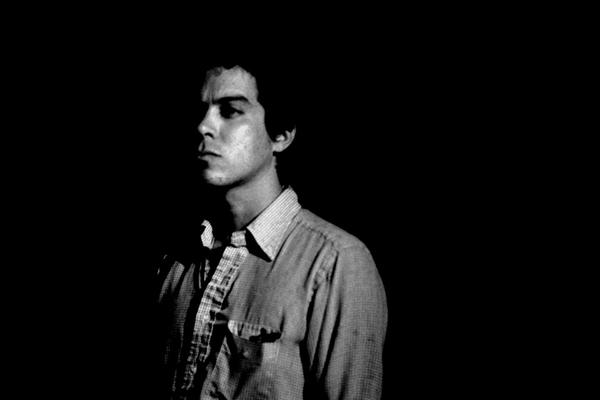
Are you working on other people’s records and contributing to other projects right now?
I just played guitar on a few projects. Howe Gelb from Giant Sand? You know Giant Sand?
I don’t, but I read that he’s someone who grabbed on to you early.
Yeah, he really opened up a lot of doors for me. Great artist, great friend. At the moment I am working on the production of a friend’s record. His name is Carlos Forster.
Do you do a lot of producing?
I don’t do a lot. There’s only so much I can take on before I feel spread too thin.
Do you like producing?
I do. I love it.
Do you produce your own albums?
I do.
Is that pretty standard?
Very…Well, what do you mean standard?
Well, standard for musicians.
Ummm…That’s a very good question, and I don’t know the answer.
I’m probably the one who should know the answer.
It might be something like 50-percent of every record is self-produced…or might be something like nobody does it. In the old days, nobody produced their own stuff…but I guess that’s not true. Depends on what type of music you’re talking about…
Did you produce your own albums from the start?
I did….That’s a good question: “Are most records self-produced?â€
Ask.com!
“In the history of record making, how many have been self-produced?†is a very good question.
Alright, I will research. And how did you pick the people who worked with you on this album?
Well, in general I worked with people I’ve been working with for the last four or five years. And then certain songs, while you’re producing them, the songs tell you they want to go in a certain direction, so you try to bring in people who you think will help the song along. There’s a song called “To Save Me†that I wanted to collaborate on with [former Grandaddy frontman] Jason Lytle. And I wanted to collaborate with Lucinda Williams on “Oh Lonesome Me,†and I wanted to collaborate with Zooey on a couple of songs.
Man! It sounds like the process is very organic for you.
It’s very organic; it’s very uncomplicated. It’s a stretch to call it work. I really don’t “work†at all. I just experiment with words and sounds in the studio with my friends. Making a living from doing that, it’s absolutely crazy that I can have that privilege. I’m very lucky. There’s nothing hard about it. People that I really respect work hard, and I do work hard at what I do. But it’s not hard work, if that makes sense.
Were you excited by the outcome of the election?
Very pleased.
To put it mildly?
I was–what’s the word–speechless.
Did you have an election party or an election moment?
I watched with some friends in Los Angeles and that was very…it’s just something I’ll never forget. That moment where McCain was giving his speech that he was…that the election was over. I’m speechless. I’m still stunned.
Did you do some of the concerts for the vote?
I did a couple. In Omaha, Nebraska, with Conor and Jim James. We played a rally for an Obama speech, and that was amazing. It was incredible.
Election night itself was a surreal moment.
The whole country has been in…it’s just been a bad state of affairs for the last eight years, and it feels great to be coming out of that.
